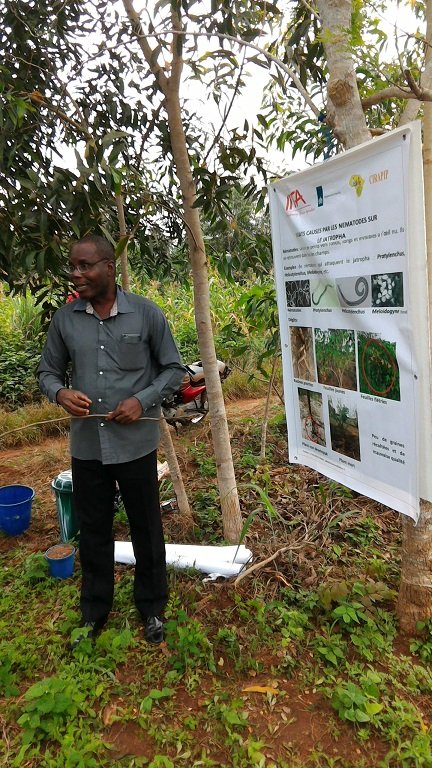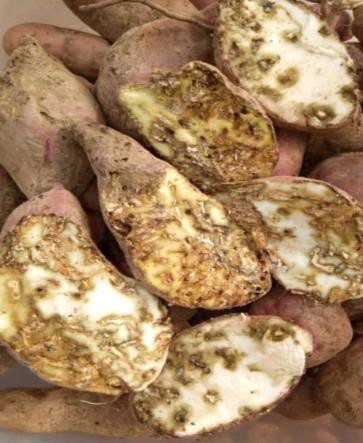|
Cycle 8 (2019 Deadline)
Entomopathogenic nematodes and plant resistance for the control of sweet potato weevils (Cylas spp.) in Benin and in South Africa
PI: Hugues Kossi Baimey (baimeyhugues@gmail.com), University of Parakou
U.S. Partner: David Shapiro-Ilan, United States Department of Agriculture/ Agricultural Research Service, Southeast Fruit and Tree Nut Research Lab
Project Dates: March 2020 - February 2022
Project Overview  | | The project PI presents work to a group of local farmers (photo courtesy of Dr. Baimey). |
Sweet potato (SP, Ipomoea batatas) is one of the most widely cultivated root and tuber crops worldwide, but its production and storage are badly affected by SP weevils, Cylas spp. This can lead to yield losses as high as 100%, especially in storage during dry seasons. In addition, the terpenes produced by the pest while feeding greatly reduce the quality of affected tubers. To control the pests, most African SP farmers resort to expensive synthetic chemical insecticides with significant environmental and health risks.
This PEER project studied the use of entomopathogenic nematodes (EPNs) of the families Heterorhabditidae and Steinernematidae and plant resistance as an efficient, cost-effective, fast, and environmentally safe pest control method. In addition to assessing the severity of damage caused by Cylas spp. to SP in Benin and South Africa, the researchers screened EPN isolates provided by a South African partner lab to assess their efficacy to control SP weevils. The two best EPN isolates were identified through such screening and will be stabilized through the development of inbred lines to prevent deterioration over time. The U.S. partner Dr. Shapiro-Ilan provided training on this process.
Final Summary of Project Activities
The PEER team began by conducting socioeconomic and farmer opinion surveys in both Benin and South Africa. More than 150 SP farmers across the two countries were surveyed on their knowledge and opinion of EPNs. During the diagnostic survey, researchers also located two SP fields infested naturally with Cylas spp. for future trials. Under laboratory conditions, the researchers mixed isolates of Heterorhabditis, as well as Steinernema nematodes. Each set of hybridized and stabilized isolates was compared with base populations for efficacy in controlling SPW and larvae. In a separate study, the researchers selected eleven isolates of indigenous EPNs from the collection at the Agricultural Research Council (South Africa) and screened them for efficacy against SPW. One was selected for field testing.
The PEER team undertook field tests of the EPN hybrids in South Africa and Benin in newly planted SP fields and existing fields infested with SPW, comparing them against fields with no treatments and those with chemical insecticides applied. The researchers collected data monthly on SPW population density, plant flowering, and damages caused by weevils to SP plants. At harvest, SP plant biomass, tuberous root weight, and damage caused by weevils were assessed visually. Soil samples were also collected from each mound for assessment of the persistence of nematodes previously applied in the soil after planting. Harvested tuberous roots were stored and the population of emerged weevils assessed daily for 10 weeks. Their results showed that entomopathogenic nematodes could serve as a potential biological control method for the control of sweet potato weevils.
The project helped train two undergraduate and two graduate students and supported smallholder farmers with planting materials and training. The PI’s lab was also outfitted with equipment for molecular work on nematodes so that they will be able to continue field experiments in the future. The researchers on the project received five separate grants worth nearly $1.2 million for future related work on their own projects and through collaborations with international teams.
Women are key stakeholders in the project, as they are frequently involved in SP production, storage, processing, and commercialization in Africa. The Development Leaders NGO in Benin and the Small Grain Institute of the Agricultural Research Council in South Africa have indicated that they are willing to produce the nematodes for farmers using the technique studied in this project.
Publication
Jesrose Ahouefa Anen Guidi, Ingrid Sonya Mawussi Adjovi, Guy Sourou Nouatin, Jean N’tcha Sema, Tshimangadzo Ramakuwela, David Shapiro-Ilan, and Hugues Baimey. 2021. Regards croisés pratiques paysannes et introduction d’innovations: Cas des nématodes comme méthode de lutte biologique contre les charançons de la patate douce au Nord-Ouest du Bénin [Cross-views of farming practices and introduction of innovations: case of nematodes as a biological control method against sweet potato weevils in northwest Benin]. Annales de l'Université de Parakou: Série Sciences Naturelles et Agronomie 11(1): 1-12. https://doi.org/10.56109/aup-sna.v11i1.18
 | | Sweet potato storage roots infested with Cylas spp. in Yaaportioh village. Photo courtesy of Dr. Baimey |
Back to PEER Cycle 8 Grant Recipients
|
|
|
|





